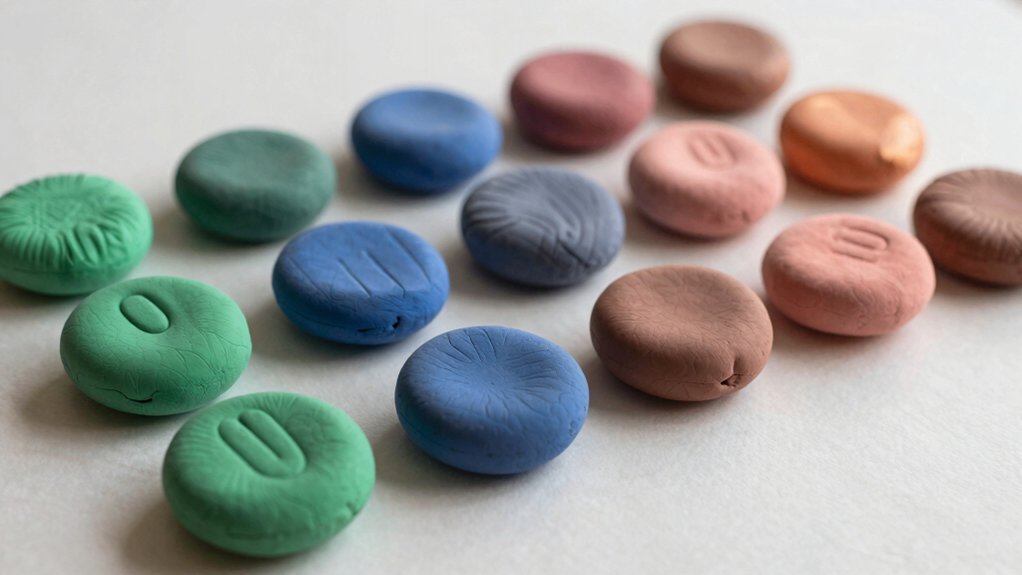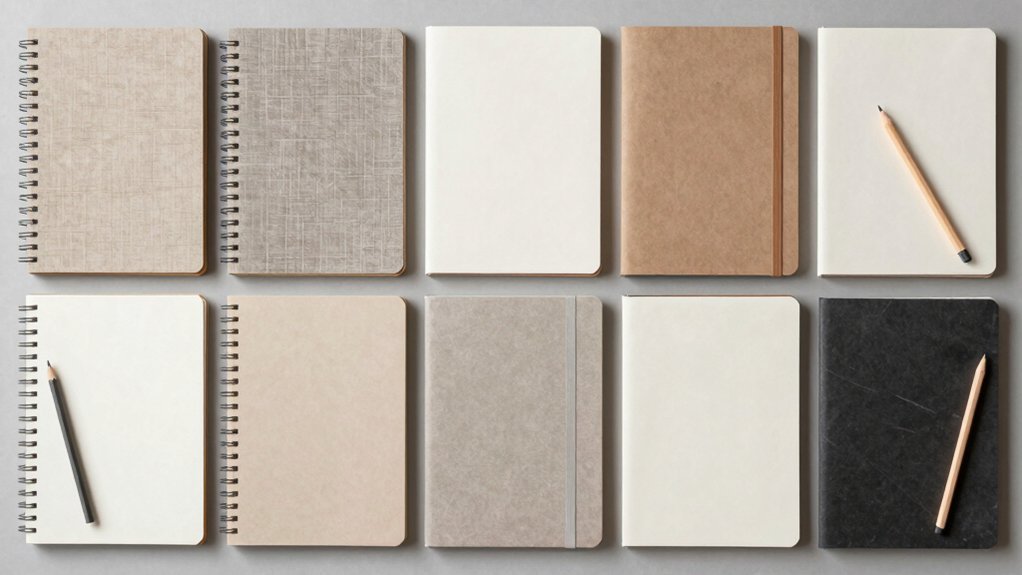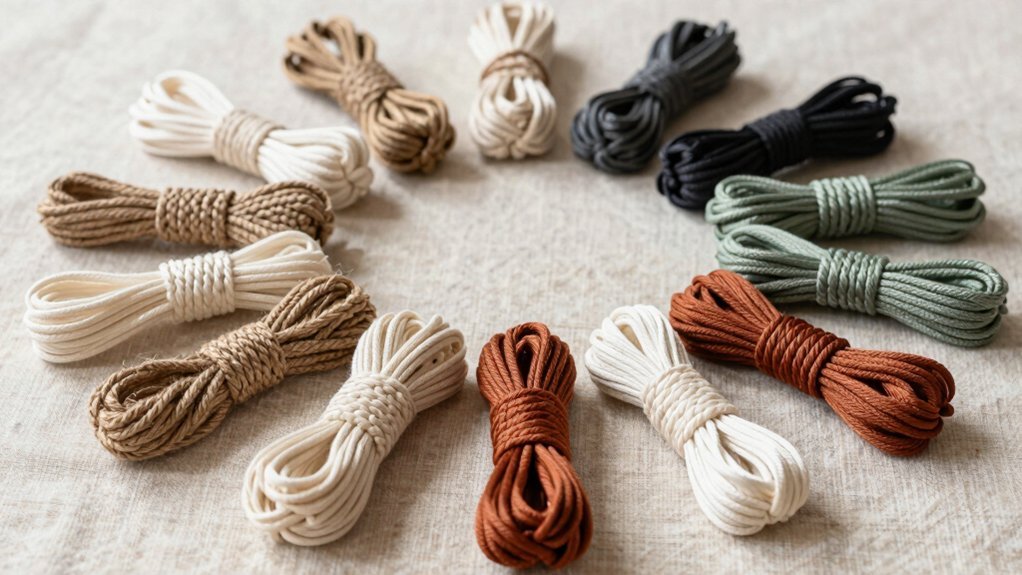Several essential oils can help ease your anxiety naturally. Lavender is a classic choice, known for its calming effects and ability to improve sleep quality. Bergamot offers uplifting citrus relief, potentially lowering cortisol levels and boosting mood. Ylang-ylang's soothing floral fragrance may slow your heart rate and reduce blood pressure, promoting calmness. Frankincense, with its rich history, can reduce stress hormones through its warm, woody aroma. You can use these oils in various ways, including diffusion, topical application, or adding them to a bath. Exploring different application methods and oil combinations can enhance your anxiety relief experience.
Understanding Essential Oils for Anxiety

With anxiety affecting millions worldwide, essential oils have emerged as a popular natural remedy. These concentrated plant extracts are believed to influence the limbic system, the part of your brain responsible for emotions and behavior.
When you inhale essential oils or apply them to your skin, their compounds interact with your body, potentially reducing anxiety symptoms.
It's important to understand that essential oils aren't a cure-all for anxiety disorders. They're best used as a complementary approach alongside professional treatment.
When choosing oils for anxiety, look for those known for their calming properties. Lavender, chamomile, and bergamot are commonly recommended for their soothing effects.
You'll find various ways to use essential oils for anxiety relief. Aromatherapy diffusers disperse oils into the air, while topical application involves diluting oils with a carrier oil before applying to your skin.
Some people add a few drops to their bath or use them in massage therapy. Remember, essential oils are potent, so always follow proper dilution guidelines and perform a patch test before use.
If you're pregnant, nursing, or have any health conditions, consult your doctor before incorporating essential oils into your anxiety management routine.
Lavender: The Calming Classic
Lavender's reputation as a calming essential oil is well-deserved. Its soothing scent has been used for centuries to promote relaxation and ease anxiety. When you're feeling stressed or overwhelmed, lavender can be your go-to natural remedy.
You can use lavender essential oil in various ways to combat anxiety:
- Add a few drops to your diffuser for a calming atmosphere
- Mix with a carrier oil and apply to your wrists or temples
- Sprinkle on your pillow for better sleep
- Add to your bath water for a relaxing soak
- Inhale directly from the bottle during stressful moments
Research supports lavender's anxiety-reducing effects. Studies have shown that it can lower heart rate and blood pressure, indicating a decrease in stress levels.
It's also been found to improve sleep quality, which is often disrupted by anxiety. Lavender's versatility makes it an excellent choice for anxiety management.
You can easily incorporate it into your daily routine, whether at home, work, or on the go. Remember, while lavender is generally safe, it's always best to consult with a healthcare professional before starting any new treatment for anxiety.
Bergamot: Uplifting Citrus Relief

Bergamot essential oil steps up as a powerful ally in the fight against anxiety. This citrus-scented oil, derived from the rind of the bergamot orange, offers a unique blend of calming and uplifting properties. You'll find it particularly effective in reducing stress, improving mood, and promoting relaxation.
Research suggests that bergamot can lower cortisol levels, the hormone associated with stress, and increase the release of mood-boosting neurotransmitters like serotonin and dopamine. Its invigorating scent can help clear your mind and ease tension, making it an excellent choice for combating anxiety-related symptoms.
To use bergamot oil, you can add a few drops to a diffuser, inhale it directly from the bottle, or dilute it with a carrier oil for topical application. It's also effective when added to a warm bath or used in aromatherapy massage.
Ylang-Ylang: Soothing Floral Fragrance
Ylang-ylang essential oil stands out as a potent remedy for anxiety with its sweet, floral aroma. Derived from the flowers of the Cananga tree, this oil's calming properties can help you relax and unwind. When you're feeling overwhelmed, stressed, or anxious, ylang-ylang can provide quick relief.
To use ylang-ylang for anxiety, you've got several options:
- Add a few drops to your diffuser for a calming atmosphere
- Mix with a carrier oil for a soothing massage
- Include in your bath water for a relaxing soak
- Apply to pulse points for on-the-go stress relief
- Blend with other calming oils like lavender or bergamot
Ylang-ylang works by slowing down your heart rate and reducing blood pressure, promoting a sense of calm.
It's also known to boost mood and self-esteem, making it an excellent choice for combating anxiety-related negative thoughts.
You'll find that regular use of ylang-ylang can lead to improved sleep quality and reduced stress levels.
Frankincense: Ancient Anxiety-Reducing Oil

Frankincense, an ancient resin with a rich history dating back thousands of years, has long been prized for its spiritual and medicinal properties.
You'll find its warm, woody aroma particularly effective in reducing anxiety and promoting relaxation through aromatherapy.
To harness its benefits, you can diffuse frankincense essential oil, apply it topically when diluted with a carrier oil, or add a few drops to your bath water for a calming soak.
Historical Significance of Frankincense
Throughout history, the allure of frankincense has captivated civilizations with its rich aroma and therapeutic properties. This precious resin has played a significant role in various cultures, religions, and healing practices for thousands of years.
You'll find frankincense mentioned in ancient texts, including the Bible, where it's described as a valuable gift presented to baby Jesus.
The historical significance of frankincense extends far beyond its aromatic appeal. It's been used for:
- Religious ceremonies and spiritual rituals
- Embalming and mummification in ancient Egypt
- Medicinal purposes in traditional healing systems
- Trade and commerce along the Silk Road
- Perfumery and cosmetics in various cultures
Frankincense's value was so great that it was often worth more than gold. Ancient civilizations, including the Egyptians, Greeks, and Romans, prized this resin for its purported ability to promote calmness and spiritual connection.
Today, you can still harness the anxiety-reducing properties of frankincense through essential oils, connecting you to a tradition of healing that spans millennia.
Calming Aromatherapy Properties
From ancient times to the present day, frankincense has been revered for its calming aromatherapy properties. When you inhale its warm, woody scent, you'll experience a sense of tranquility and grounding.
This powerful essential oil works by interacting with your limbic system, the part of your brain responsible for emotions and memory.
Frankincense's ability to ease anxiety stems from its chemical composition. It contains alpha-pinene and limonene, compounds known for their calming effects on the nervous system. These molecules help reduce stress hormones like cortisol, promoting relaxation and mental clarity.
You can harness frankincense's benefits in several ways. Try diffusing it in your home or office to create a peaceful atmosphere. For a more direct approach, add a few drops to a carrier oil and apply it to your pulse points. You can also incorporate it into your meditation practice by inhaling its aroma from your palms.
Regular use of frankincense essential oil may help improve your overall emotional well-being, reduce feelings of anxiety, and enhance your ability to cope with daily stressors.
Its natural, non-invasive nature makes it an excellent complement to other anxiety management techniques.
Methods of Application
When it comes to applying frankincense essential oil for anxiety relief, you have several effective methods at your disposal. The key is to find the application technique that works best for you and your lifestyle.
Inhalation is one of the quickest ways to experience the calming effects of frankincense. You can simply open the bottle and take a few deep breaths or use a diffuser to disperse the oil throughout your space.
Topical application is another popular method. Mix a few drops of frankincense with a carrier oil like coconut or jojoba, then apply it to your pulse points, neck, or temples. For a more immersive experience, add frankincense to your bathwater or use it in a relaxing massage.
Here are five common methods for using frankincense essential oil:
- Diffusing in an aromatherapy diffuser
- Adding to a warm bath
- Applying diluted oil to skin
- Inhaling directly from the bottle
- Using in a personal inhaler or aromatherapy jewelry
Remember to always dilute frankincense oil before applying it to your skin and start with a small amount to test for any sensitivities.
Blending Oils for Maximum Effect
When it comes to using essential oils for anxiety relief, you'll often find that combining multiple oils can enhance their effectiveness.
You'll want to learn about synergistic oil combinations that work well together, as well as proper dilution techniques to guarantee safe use.
Understanding various application methods, such as diffusion, topical use, or inhalation, will help you maximize the anxiety-reducing benefits of your essential oil blends.
Synergistic Oil Combinations
Synergy is the key to accessing the full potential of essential oils for anxiety relief. When you combine certain oils, their individual properties work together to create a more powerful effect. This synergistic approach can enhance your anxiety-reducing results and provide a more thorough treatment.
To create effective synergistic blends, consider these popular combinations:
- Lavender and bergamot for a calming and uplifting effect
- Frankincense and ylang-ylang to promote relaxation and emotional balance
- Vetiver and chamomile for grounding and soothing properties
- Clary sage and geranium to reduce stress and hormonal imbalances
- Lemon and peppermint for an energizing and mood-boosting blend
When blending oils, start with a 2:2:1 ratio, using two parts of your primary oil, two parts of your secondary oil, and one part of your complementary oil. You can adjust this ratio based on your personal preferences and the specific properties of each oil.
Remember to always dilute your blends properly before applying them to your skin or using them in a diffuser. By experimenting with different combinations, you'll discover the perfect synergistic blend to address your unique anxiety symptoms and promote overall well-being.
Proper Dilution Techniques
Proper dilution is the foundation of safe and effective essential oil use. When blending oils for anxiety relief, you'll need to mix them with a carrier oil to prevent skin irritation and enhance absorption. Common carrier oils include jojoba, coconut, and sweet almond oil.
For a 2% dilution, which is generally safe for adults, add 12 drops of essential oil per ounce (30 ml) of carrier oil.
To create a synergistic blend, combine 2-3 anxiety-reducing oils. For example, mix 4 drops of lavender, 4 drops of bergamot, and 4 drops of ylang-ylang with 1 ounce of carrier oil. This creates a balanced, effective blend for stress relief.
If you're new to essential oils, start with a lower concentration (1%) and gradually increase as needed. For children or sensitive individuals, use a 0.5-1% dilution.
Always perform a patch test before applying any new blend to larger areas of your skin.
Application Methods Matter
Blending essential oils for anxiety relief goes beyond simply mixing them together. To maximize their calming effects, you'll need to contemplate various application methods. Each technique offers unique benefits and can enhance your overall experience.
When creating anxiety-relieving blends, keep these application methods in mind:
- Diffusion: Use an essential oil diffuser to disperse the aroma throughout your space.
- Topical application: Apply diluted oils directly to your skin, focusing on pulse points.
- Inhalation: Inhale the scent from a tissue or your palms for quick relief.
- Bath or shower: Add oils to your bathwater or shower for a relaxing experience.
- Massage: Incorporate oils into a massage oil for a soothing self-care ritual.
You'll want to experiment with different methods to find what works best for you. Some people prefer the convenience of a roll-on applicator, while others enjoy the ambient effects of diffusion.
Frequently Asked Questions
Are Essential Oils Safe for Pregnant Women With Anxiety?
You should be cautious with essential oils during pregnancy. While some may help with anxiety, others can be harmful. Always consult your healthcare provider before using any essential oils when you're pregnant to guarantee safety.
Can Essential Oils Interact With Anxiety Medications?
Yes, essential oils can interact with anxiety medications. You should always consult your doctor before using them alongside prescribed drugs. They might enhance or interfere with your medication's effects, potentially causing unexpected side effects or reduced efficacy.
How Long Do the Anxiety-Reducing Effects of Essential Oils Last?
You'll find that the anxiety-reducing effects of essential oils typically last for a few hours. However, it should be emphasized that individual experiences can vary. You may need to reapply or diffuse oils periodically for continued benefits.
Are There Any Essential Oils That Worsen Anxiety Symptoms?
You should be cautious with certain oils. Peppermint, rosemary, and citrus oils may increase alertness and potentially worsen anxiety for some people. It's best to test oils individually and listen to your body's response.
Can Children Use Essential Oils for Anxiety Relief?
You should be cautious when using essential oils with children. It's best to consult a pediatrician first. If approved, dilute oils properly and use gentle options like lavender or chamomile under adult supervision.
In Summary
You've now discovered several essential oils that can help ease your anxiety naturally. Remember to use these oils safely, whether through diffusion, topical application, or inhalation. Don't hesitate to experiment with different blends to find what works best for you. While essential oils can be powerful allies in managing anxiety, they're not a substitute for professional help. If you're struggling with severe anxiety, it's always best to consult a healthcare provider.





Leave a Reply